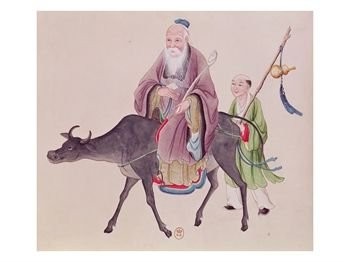S.F. CA 94164-0023 An Introduction to Taoism  Taoism originated in China. Its inception dates back over 4,600 years and is attributed to Emperor Shuan Yuan Huang Di, but its principal teachings were not canonized and propagated until the Tao Te Ching (Scripture of Tao and Virtues) was written by Lao Zi (also known as Lao Tse) approximately 2,600 years ago. Taoism originated in China. Its inception dates back over 4,600 years and is attributed to Emperor Shuan Yuan Huang Di, but its principal teachings were not canonized and propagated until the Tao Te Ching (Scripture of Tao and Virtues) was written by Lao Zi (also known as Lao Tse) approximately 2,600 years ago.The word "Tao" means the "Way" or road. It is a way of achieving unity or complete attunement with the Ultimate Reality of the Universe. This Ultimate Reality is the all-embracing and everlasting higher force that gives birth to and governs all things in the universe, and is beyond the power of human comprehension or description. Hence, no attempt is made to describe it or give a name to it, but it is often referred as Tao. The goal of all Taoists is to attain unity with the Tao through the cultivation of virtue, meditation, and purification of the mind. Taoism has great respect for nature and living beings because nature is a manifestation of the Tao. Hence, harmony with nature and respect for the environment are very important to Taoists. Taoists honor Lao Zi, also known as Supreme Old Lord, as the founder of Taoism and their chief deity. Lao Zi wrote, "Those who are at one with the Tao are those who embody unwavering purity and tranquility." The highest deities are The Three Pure Ones (Celestial Lords Yuan Shi, Ling Bao and Tao Te), but the Taoist pantheon includes many deities, immortals and perfected spiritual beings. Among the well-known deities are immortal Master Lu Sun Yang, Lord General Kuan Ti, Jade Emperor and Goddess Tien-Hou. The primary canon of Taoism is the Tao Te Ching (also known as Dao De Jing), but the essential daily liturgies include the Pre Tranquility Scripture and the Jade Emperor Mind Seal Scripture. Because Taoism developed over many centuries and in different regions of China, many schools and traditions of Taoism have been established and exist today. Of these, two schools have been most widespread - the Jeng Yi School and the Chuan Jen (Complete Realization) School. While the Jeng Yi School emphasizes devotional practices, prayers and rituals, the Complete Realization School emphasizes meditation and cultivation of virtues. Central to the teachings of the Complete Realization School and other Taoist schools is the cultivation of the "Nine Virtues" as the foundation for spiritual development: 1) Loyalty in carrying out duties; 2) Filial duty in honoring parents; 3) Simplicity in living; 4) Integrity in cultivating humility; 5) Righteousness in dealing with all matters; 6) Truthfulness in conducting human relations; 7) Benevolence in respecting people; 8) Kindness in caring for all living beings; 9) Courtesy in fostering proper conduct. Taoism is much more than a religion, it is a philosophy, a road to spiritual cultivation, and a major force that has shaped the Chinese. Lao Zi, born during the Chou Dynasty (approximately 2,600 years ago) in Northwestern China, was a historian in the Imperial Chou court, but focused his time on the cultivation of Virtue and learning the laws of the Tao. Seeing the corruption of the Chou court, Lao Zi decided to leave the country. As Lao Zi rode an ox towards the city gate, the gatekeeper saw the glow of a halo approaching. The gatekeeper knew that a holy man was arriving and persuaded Lao Zi to stay and write down his teachings for posterity. Lao Zi stayed over one hundred days and wrote the Tao Te Ching. After completing this great work, Lao Zi left through the city gate never to be seen again. The Tao Te Ching is the most important book in the Taoist canon and embodies the key principles of Taoism. This work of great wisdom is comprised of 81 chapters divided into two sections. The first section talks of the Tao and its ways. Lao Zi states, "The Tao gave birth to the one, the one gave birth to the two, the two gave birth to the three, and the three gave birth to all things." The second section teaches the cultivation of Te (Virtues) and how this will bring everlasting peace and harmony. Lao Zi tells us, I have three treasures dear to my heart. The first is compassion, the second is frugality and the third is humility. From compassion comes courage. From frugality comes generosity and from humility comes leadership. Lao Zi's teachings form the philosophical foundation of Taoism and have had a profound influence on Chinese culture. The Tao Te Ching is one of the most translated books in the world.
|
